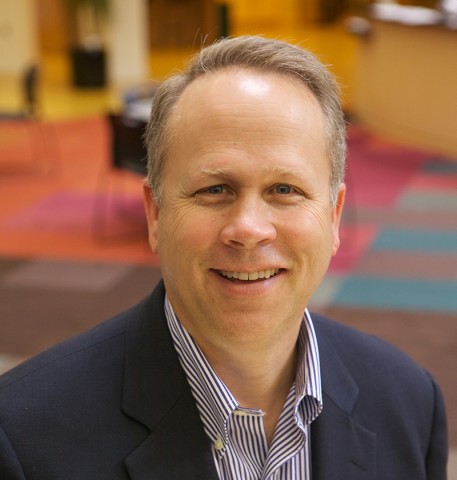
The Vivian A. and James L. Curtis School of Social Work Research and Training Center is dedicated to providing support for research that creates social change and helps to improve the lives of underserved populations. The Curtis Center functions as a strong collaborative between U-M faculty, community and university partners and students in their efforts to make a positive impact upon the lives of those most in need.
Joseph Himle, associate professor of Social Work and Psychiatry, is director of the Curtis Center. He explains that the center functions as a central hub for researchers, serving as a research incubator, evaluation training, and research support service resource for the U-M School of Social Work community. There is a particular emphasis on narrowing the gap in mental and physical health disparities.
The Center is a busy place where faculty, students and staff are aiming their efforts at improving the lives of society’s most vulnerable individuals through research and evaluation excellence.
“We have a strong focus on mental health and healthcare disparities in the underserved,” he said. “We are very interested in the limited access to best practice mental health and health services that exists in these populations, and we place a priority on addressing those service access inequities.”
The Center provides support to researchers with the help of two multidisciplinary teams who function separately but ultimately blend together to accomplish the Center’s stated mission of furthering society’s understanding and treatment of behavioral and physical health conditions and improving the lives of underserved populations.
The Research Support Services Team provides a wide range of services to help researchers accomplish their research goals, including expert consultations from the early conceptual phase to assisting after initial funding, supporting innovative early-stage projects through the faculty pilot grant program, postdoctoral fellowships, research workgroup support, educational programming (see “Pizza and Pontification” series), community building events and doctoral research and travel awards.
The Program Evaluation Group is the training ground for MSW and postdoctoral students focused on program evaluation science. The team also provides comprehensive evaluation services to outside entities and community-based agencies, collecting and analyzing information that these agencies use to make informed decisions about how to improve effectiveness and efficiency of both new and existing programs.
“In many cases, our program evaluation projects lead to knowledge development opportunities for our faculty and students,” Himle said.
The Washtenaw County Sheriff’s Office (WCSO) Division of Community Engagement Evaluation is one example of the many different types of projects currently making its way through the evaluation program.
The Program Evaluation Group is evaluating several projects for the WCSO, including the development of a jail reentry program and the implementation of inmate behavior management (IBM) and problem oriented policing (POP), which are progressive forms of corrections and police work.
According to Evaluation Associate Desiree Liwosz, U-M MSW, current Washtenaw County prison recidivism rates are estimated to be 76 percent, more than double the State of Michigan’s at approximately 30 percent. And the rate of jail recidivism, while much more difficult to assess, is believed to reflect a percentage similar to prison rates.
“IBM allows corrections officers to assess the needs of incarcerated individuals to provide needed and impactful services, while POP helps deputies to understand and examines root causes of crime while still enforcing the law,” said Liwosz.
Derrick Jackson, a graduate of U-M SSW, is the director of community engagement for the WCSO and the direct U-M contact for the project. He and Liwosz have worked closely with new U-M faculty member Reuben Miller, who also collaborates with the Curtis Center on other criminal justice projects. Principal investigator on the project is Clinical Assistant Professor Sue Ann Savas.
In addition to its Program Evaluation and Research Support Services, the Curtis Center places a strong emphasis on education for MSW students and postdoctoral fellows. MSW students get lab experience by participating in current program evaluation projects and also are able to take advantage of a range of workshops and training events.
The postdoctoral fellowship program helps doctoral fellows prepare for future leadership as academics in social work. Current fellows, Addie Weaver, PhD and Elizabeth Thomason, PhD are both pursuing careers as mental health intervention researchers with a special emphasis on underserved populations.
“The Center is a busy place where faculty, students and staff are aiming their efforts at improving the lives of society’s most vulnerable individuals through research and evaluation excellence,” said Himle.
The Curtis Center is supported by internal funds from the U-M SSW, revenue from program evaluation and other research projects and from philanthropic support.
The Curtis Center is named in honor and recognition of the generous support of Dr. James L. Curtis and his wife Vivian A. Curtis. James Curtis is a 1946 graduate of the U-M Medical School. Vivian Curtis is a 1948 graduate of the U-M School of Social Work.
Written by Anne Farris